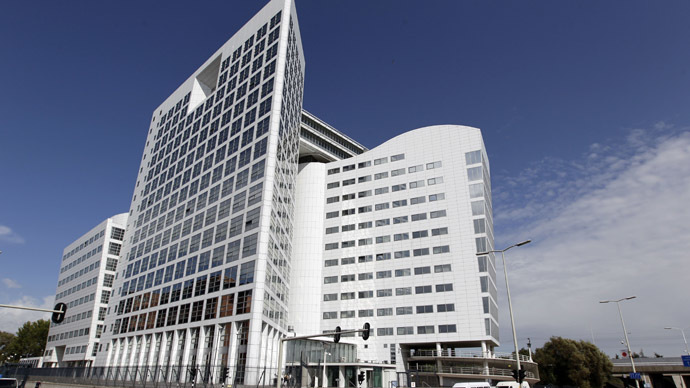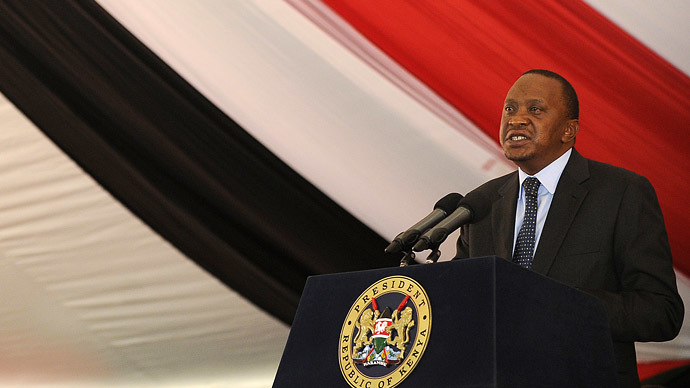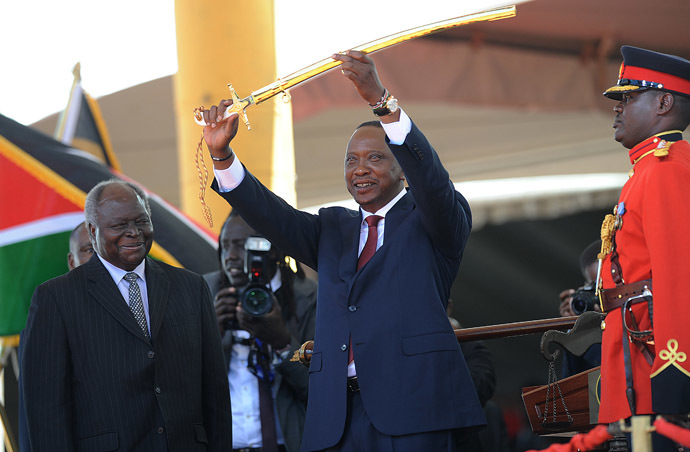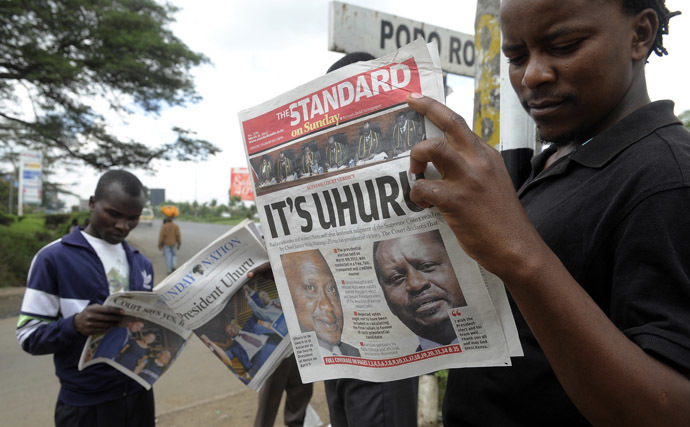The International Controversy Court: Why its selective justice is failing Africa and the world

At the just-concluded extraordinary session of the African Union in Addis Ababa, accusations flew thick and fast about the alleged bias of the International Criminal Court.
Hailemariam Dessalegn, the
Prime Minister of Ethiopia and currently African Union chairman,
read out the union’s collective complaint against the ICC’s
“unfair treatment” of Africans, and trashed the ICC as
“a condescending political instrument targeting Africa and
Africans.”
Kenyan President Uhuru Kenyatta, who is resisting a summons to appear before the ICC for his suspected hand in organizing ethnic pogroms in his country in 2007-08, said the ICC was a racist “toy of declining imperial powers.” The summit ended with a joint recommendation that President Kenyatta skip his trial at the ICC, which had been scheduled for November this year.
African Union countries send 34 state party representatives to the ICC, which sits in the Dutch city of The Hague.
With only 122 out of 193 UN member states full members of the ICC, any attempted mass pullout of the African bloc’s 34 state parties from the ICC’s Rome Statute could be a debilitating blow to the future of an institution that seeks to hold even heads of state to account. The ruckus about the ICC’s perceived single-minded obsession with crimes occurring in Africa alone, while neglecting heinous actions elsewhere in the world, is not a great advertisement for the 70-odd non-state parties to one day sign up and ratify the Rome Statute.
Values overlaid with interests
However, no agreement was reached among African Union state parties about withdrawing from the ICC. Instead of following the example set by Kenya’s parliament, which recently voted to leave the ICC’s jurisdiction in retaliation for cases brought against the country’s president and vice president, the AU’s state parties could not muster unanimous agreement to boycott the court.
The ICC has been useful to some African governments with four out of the eight ongoing ICC cases against African individuals being referred to the Hague by African governments themselves. The governments of the Democratic Republic of Congo, Uganda, the Central African Republic and Mali have sought to internationally punish rebels beyond the reach of national justice by seeking ICC assistance as a last resort. The first conviction of Thomas Lubanga, a Congolese warlord, was achieved in 2012 by the ICC with the active cooperation of the DR Congo government.
The pattern has been that lawless killers opposed to sitting governments are referred to the court by African ruling elites. In such cases, there is no contradiction between the ICC’s universal value of preventing grave human rights abuses and the interests of African states. The ICC can be seen to be enhancing state capacities here by lending a helping hand to bring serious offenders to book.

Sovereign immunity or impunity?
Not many governments would refer their ruling politicians or military officers to an external inquiry for war crimes or crimes against humanity, but the rub lies in instances where the ICC’s Prosecutor General (the present occupant Fatou Bensouda is ironically a lawyer from the West African nation of Gambia) takes up investigations against African heads of state. The AU’s special summit in Addis Ababa categorically warned the ICC against prosecuting incumbent heads of state, adding that the Court must not insult leaders who were chosen by their respective people in their home countries.
The notion that elected politicians holding the highest office of their land are immune from international criminal trial or investigation is inherently undemocratic. Nobel laureate Archbishop Desmond Tutu of South Africa has equated unaccountable African leaders “looking for a license to kill, maim and oppress their own people” to perpetrators of the Nazi genocide and critiqued their “playing both the race and colonial cards” for vilifying the ICC. He reflects an evident tension between African rulers who are irked with the ICC’s singular focus on going after them and African civil society activists who do not accept the slur on the ICC as a “white man’s witch hunt.”
Just as African governments have found in the ICC a convenient partner to nail anti-state rebels, Africa’s liberal-minded peace and justice movements are not averse to using the ICC to democratize their own societies. Differences on the ICC between African states and their conscious citizens are thus mirrors on the current struggles for shifting political and economic power away from coteries surrounding the ruling class and redistributing them among African people. Thanks to this sharp state-society divergence, not all the AU’s parties to the ICC could agree unanimously at the Addis Ababa special summit to reject the jurisdiction of the Court.
Unequal justice
Despite the ICC serving the ends of some African governments and activists on a case-by-case basis, the controversy about the absence of any non-African cases in the Court’s agenda does raise troubling questions about its overall objectivity and balance. It is inconceivable that equally bad or worse crimes against humanity have not been committed outside Africa since the Rome Statute of the ICC came into force in 2002.
Selfish African leaders may be trying to carve out exceptions from universal justice by highlighting the seeming double standards of the Court, but the empirical reality does indicate that the Court has ignored non-African situations involving extreme violence perpetrated on a mass scale.
Notwithstanding fervent calls by international justice activists to bring the American leadership and its British allies to the dock for devastating Iraq and Afghanistan during the global War on Terror, neither President George W. Bush nor Prime Minister Tony Blair had to face trial. Admittedly, the US is not a state party to the Rome Statute and hence its citizens are technically not liable to be held accountable at the ICC (except if their cases were referred directly by the UN Security Council).
But the UK is a state party and its political leadership could have been investigated at The Hague, given the lack of any serious probe in Britain itself. The Chilcot Inquiry in Britain, where Blair appeared for hearings, did not scrutinize the human rights abuses and violent actions committed by British forces in the Iraq war, or the then-Prime Minister’s command responsibility for them.
Occasional trials of American or British soldiers who went overboard in abusing civilians in Iraq and Afghanistan elide the larger political question of responsibility for Bush and Blair’s torture-enhancing and civilian-crushing ‘war on terrorism’. The miscarriage of international justice with regard to the War on Terror was summed up in the nonchalant words of Blair’s Foreign Secretary, Robin Cook, who is said to have remarked that the ICC was “not set up to bring to book Prime Ministers of the United Kingdom or Presidents of the United States.”
Such blatant statements reveal a tacit red line that the Court dare not take up cudgels against strong states, particularly Western permanent members of the UN Security Council. African heads of state are apparently lesser creatures who can be shown the full might of international justice.

The UN Security Council’s court?
By far the most politicized features of the ICC are provisions in the Rome Statute for the UN Security Council to have the power to refer specific cases for investigation to the Court no matter where they occur and who the perpetrator is (even non-parties to the Statute fall under its ambit), and to also defer legal proceedings with a view to finding pragmatic solutions to major armed conflicts. The same African leaders crying wolf at the putative racism of the ICC are masters at invoking the UNSC’s deferral powers to suspend trials against President Omar al-Bashir of Sudan and now President Uhuru Kenyatta of Kenya.
The AU has tried to convince permanent members of the UN Security Council via diplomatic and strategic considerations to enable its star indictees to get off the hook. In the case of President Bashir, who had antagonized the US, UK and France, this ploy failed. But in the case of President Kenyatta, who is a staunch ally of Western commercial and security interests in East Africa, the misuse of the UN Security Council prerogatives regarding the ICC may stand a better chance. If selectivity is the overarching flaw of the ICC’s functioning thus far, the Security Council’s privileges accentuate this blemish.
It is owing to the apparent subservience of the ICC to the Security Council that countries like India have refrained from joining the Rome Statute. If the Security Council has the ultimate power to refer cases (as it did in the instances of Darfur and Libya), India argues that this transfers extraordinary control over destinies of non-state parties into the hands of permanent members of the Council. For countries like India, who have refused to join the ICC, it is all the more galling that the Security Council, three of whose five permanent members are not signatories to the Rome Statute, can haul other non-parties to The Hague to face trial.
The comment of the Prosecutor General of the ICC, Fatou Bensouda, that no case has yet been brought against either the government or the anti-government insurgents in the horrific war in Syria because “we cannot bypass processes” such as the UN and Arab League peace plans for that country – shows how the excuse of a political settlement can be misappropriated by the Security Council to keep deferring cases, even as hundreds of thousands of innocents get slaughtered.
If a body like the Security Council, which is premised on exhausting non-military solutions to armed conflicts before resorting to force, has the final say in deferring the ICC’s expansion beyond Africa, the paucity of non-African cases is no longer a mystery.

Since there is no full public record of how often and in which specific countries the Security Council influences the ICC to turn a blind eye to grave violations, we are left guessing as to why a country like Sri Lanka escaped international justice in spite of clear evidence of terrible atrocities being committed in the final phases of its war against Tamil separatists and perpetrators not being subject to any domestic legal action whatsoever. Why does Israel (another non-party to the Rome Statute), which is known for serial deployment of disproportionate force in wars against its neighbors, never get referred to the ICC? Washington’s voting and lobbying in the Security Council hold the keys to such open secrets.
Selective or incremental?
The ultimate verdict on the ICC’s contribution to advancing global justice depends on whether one sees the glass as half empty or half full. For the AU’s peeved heads of state and other non-parties who refuse to come under the Rome Statute, the ICC’s Afro-centric agenda is proof of selective justice that spares powerful states and their protected elites. In this sense, it is yet another tool of the vested interests of the powers-that-be to subjugate and deter sovereignty of those who stand up to imperialism. The problem for these opponents of the ICC is not the Court per se but the unequal international system which forces this potentially impartial judicial institution to bow to political masters and aggravate pre-existing global power disparities.
For advocates of the Court who nurse high hopes that it would incrementally absorb all UN members as state parties, failure to protect anyone because of the impossibility of protecting everyone is an unpardonable sin. These believers of the ICC contend that, at least where there is no Security Council obstructionism, crimes against humanity ought to be accounted for and deterred through international judicial due processes. Archbishop Tutu’s vision dismisses the worldwide inconsistencies and selective prosecutions of the Court and instead harps on rendering his African region humane with the ICC’s involvement.
Could the ICC eventually shape into an institution that bridges the gap between the Panglossian regionally-focused sympathizers on one hand and the pessimistic systemically-oriented detractors on the other? The fates of victims of barbaric violence are hanging on a resolution to this dichotomy.
The statements, views and opinions expressed in this column are solely those of the author and do not necessarily represent those of RT.
The statements, views and opinions expressed in this column are solely those of the author and do not necessarily represent those of RT.













